Office of War Information – Descriptions of Voice of America, OWI, and Office of Censorship Show Similarities to Disinformation Governance Board
The Office of War Information (OWI) and the Voice of America (VOA) during the Second World War would have been the closest model for comparison to the Disinformation Governance Board (DGB), an advisory board of the United States Department of Homeland Security (DHS), announced on April 27, 2022, to protect national security by disseminating guidance on combating disinformation but later paused as a result of public criticism from the right and the left. The OWI and VOA fought Nazi propaganda but were easily duped and subverted by disinformation from Soviet Russia and other communist sources. A closer study of the history of World War II U.S. government domestic and overseas propaganda operations could have prevented the embarrassment of trying to establish and having to scrap the Disinformation Governance Board. The Cold War Radio Museum has a review of some relevant facts and documents.
By Ted Lipien
Office of War Information in United States Government Manual – 1945
United States Government Manual – 1945 (March) First Edition, edited by the Division of Public Inquiries in the Office of War Information in Washington, D.C. and published by the Government Printing Office, contains an early and possibly the first official reference to the “Voice of America” name for World War II U.S. government’s shortwave overseas radio broadcasts.[ref]Ted Lipien, “80 Years of VOA: Different Names of the Voice of America, Voice of America – 80 Years of Hidden History,” Voice of America – 80 Years of Hidden History (blog), accessed May 13, 2022, https://www.voa80.com/2022/02/01/80-years-of-voa-different-names-of-the-voice-of-america/.[/ref] The one-sentence reference is not officially associated with any specific office producing VOA programs within the OWI. Shortwave radio broadcasts, which acquired the Voice of America name only after the war, were produced by the Overseas Operations Branch in the Radio Program Bureau in the OWI’s New York Office.
As described in the United States Government Manual, the purpose of the Office of War Information, including its radio broadcasting operation, was to help in the war effort against Nazi Germany and Japan:
a. Formulate and carry out, through the use of press, radio, motion picture, and other facilities, information programs designed to facilitate the development of an informed and intelligent understanding, at home and abroad, of the status and progress of the war effort, and of the war policies, activities, and aims of the Government.
b. Coordinate the War informational activities of all Federal departments and agencies for the purpose of assuring an accurate and consistent flow of war information to the public and the world at large.
c. Obtain, study, and analyze information concerning the war effort and advise the agencies concerned with the dissemination of such information as to the most appropriate and effective means of keeping the public adequately and accurately informed.
d. Review, clear, and approve all proposed radio and motion picture programs sponsored by Federal departments and agencies; and serve as the central point of clearance and contact for the radio broadcasting and motion picture industries, respectively, in their relationships with Federal departments and agencies concerning such Government programs.
e. Maintain liaison with the information agencies of the United Nations for the purpose of relating the Government’s informational programs and facilities to those of such nations.
The description of OWI’s mission abroad, written by OWI staffers and approved by the agency’s director, mentioned that “The Overseas Operations Branch plans and executes the wartime information and propaganda activities of the United States Government in all countries outside the Continental limits of the United States, except Central and South America.”
It also underscored the OWI’s close links with the U.S. military in carrying out psychological warfare operations.
In active military zones, the Office of War Information works with United States and Allied military agencies in the prosecution of psychological warfare. OWI outposts operate in more than a score of allied and neutral nations. In other areas OWI provides State Department missions with informational materials for distribution.
The Manual also pointed out that “Through radio broadcasts, newspapers, publications, motion pictures, news pictures, exhibits, and other media, the Overseas Branch works to”:
1. Undermine the enemy’s morale and will to fight.
2. Strengthen the resistance of the peoples of enemy-occupied territories.
3. Create friendlier relations with the peoples of areas where our forces are stationed or which are traversed by our military supply lines.
4. Inform other nations of the part the United States is playing in the war.
5. Convince neutral nations that a United Nations victory is inevitable and desirable.
6. Generally engender a better understanding abroad of the United States, its war aims and its post-war interests and purposes. Headquarters of the Overseas Branch are in Washington, Other offices are maintained in New York and San Francisco.
What is now the Voice of America was officially called in 1945 “Radio Program Bureau.”
This Bureau is responsible for the preparation and production of all short-wave radio programs originating in the Atlantic area, the translating of all foreign language productions – publications, motion pictures, and feature materials – and for servicing cooperating medium-wave radio stations in foreign countries with recordings and other programming. Broadcasts are conducted in about 20 languages with about 1,500 broadcasts a week.
The Manual also mentioned that the Basic News Division in the separate News and Features Bureau “supplies a daily news report for use on shortwave news broadcasts produced by the Radio program Bureau and for the output of the Cable-Wireless Division.”
It was clear that the Office of War Information was an all-media, all-civilian propaganda, and all-public diplomacy operation of the U.S. government, combining what are now separate roles: the Voice of America’s media outreach and the State Department’s public. The Manual noted that the OWI had outposts and personnel in many countries, including Australia, China, England, France, and the USSR.
Coordination of Voice of America and Soviet propaganda and its coverup
What the American public did not know was that during that time, the Office of War Information also secretly coordinated Voice of America radio propaganda with Soviet propagandists through contacts with the Soviet Embassies and with the enthusiastic support of most of its radically left-leaning editors and broadcasters. Most of these senior-level contacts were in London rather than in Moscow or Washington. The chief coordinator of OWI and VOA propaganda with Soviet propaganda, who, in carrying out this mandate, was meeting with the Soviet representatives in London, was the director of the OWI’s Overseas Operations Branch, Robert E. Sherwood. He was also a well-known playwright and President Franklin Delano Roosevelt’s speechwriter. Before going to London, he issued propaganda directives for VOA broadcasters in New York. He carried out his propaganda coordinating activities with the Soviet Embassy contacts in London until he resigned to help with President Franklin Delano Roosevelt’s 1944 election campaign.
Sherwood’s protégé at the Voice of America was VOA’s first chief news writer and editor, Howard Fast. An American author of best-selling historical novels, he formally joined the Communist Party in 1943, resigned from OWI in 1944, and in 1953 received the Stalin Peace Prize.[ref]Ted Lipien, “Howard Fast – Chief of Voice of America News Who Won the Stalin Peace Prize, Voice of America – 80 Years of Hidden History,” Voice of America – 80 Years of Hidden History (blog), accessed January 26, 2022, https://www.voa80.com/2021/12/21/howard-fast-chief-of-voice-of-america-news-who-won-the-stalin-peace-prize/.[/ref] While writing VOA news programs, Fast maintained contact with the Soviet Embassy personnel in the United States, most likely Soviet propaganda and intelligence officers. While he denounced Stalin in 1956, admitted he was duped, and left the Communist Party USA, he did not condemn Marxism or the Soviet Union. He also did not return his Stalin Peace Prize.
Fast and others were Soviet agents of influence rather than spies, but several Office of War Information employees were reporting to the Soviet intelligence and could be regarded as active agents or spies in the OWI offices and in some of the Voice of America’s major foreign language services, although they probably did not occupy any senior positions.[ref]In their book, Venona: Decoding Soviet Espionage in America, published in 1999 by Yale University Press, Haynes and Klehr, wrote that the U.S. government’s initially top-secret Venona project for deciphering Soviet cable traffic “contains the unidentified cover names of several Soviet espionage contacts in the Office of War Information… [including] Philosopher (OWI French section), Fred, and Leona.” The KGB used Philosopher for “providing background information and character appraisals – of OWI personnel.” According to Haynes and Klehr, the most active Soviet agent in the OWI revealed in Venona was Flora Wovschin. Mentioned in 20 deciphered KGB Venona cables, she was praised for her energy and dedication in providing information from the OWI, where she worked as a senior research assistant in what would have been the Voice of America Library. Shortly after the end of the war, she resigned from her newly obtained job in the State Department and escaped to the Soviet Union. Earl Haynes and Harvey Klehr, Venona: Decoding Soviet Espionage in America (New Haven and London: Yale University Press, 1999), pp. 198-201.[/ref]
The subversion of the Office of War Information and the Voice of America by Soviet Russia during World War II and for a few years after the war has been covered up by the successive VOA managements, due to shame over the journalistic failures, for partisan reasons, and mostly to protect the institution’s reputation. This episode in VOA’s early history is not widely known or discussed in the United States. However, such unwillingness to confront inconvenient facts still helps the less competent government officials and government-employed journalists to avoid oversight and accountability. The lack of historical knowledge and perspective also allows them to make vastly exaggerated claims of their past and current effectiveness. Such behavior is common among all government officials and some government employees who want to protect their jobs and their departments’ budgets.
The period when the Voice of America was most effective was during the later years of the Truman administration and during the Reagan administration, when it contributed to the fall of communism in the Soviet Union and in East-Central Europe, although not nearly as much as Radio Free Europe (RFE) and Radio Liberty (RL). Both administrations carried out radical personnel and programming reforms at VOA. But as events in Afghanistan, China, Cuba, Iran, and Russia have shown, VOA’s relevance and effectiveness seem now minimal. Africa may still be one of the few regions, where VOA can claim to have some audience for its English-language content, but as Senator John Barrasso (R-Wyoming) pointed out during a recent confirmation hearing for the former VOA director Amanda Bennett, who was nominated by President Biden to be the next CEO of the U.S. Agency for Global Media (USAGM), which is now the oversight agency for VOA, many of the African countries did not side with the United States government last March in the General Assembly of the United Nations to support Ukraine after President Vladimir Putin ordered the Russian Army to invade a much smaller sovereign nation that represented no threat to Russia.
VOA broadcasts also did not help to speed up the end of World War II, prevent the Holocaust, or stop the establishment in Eastern Europe of Soviet-dominated communist regimes after the war, perhaps partly because they were too corrupted by communist ideology and Soviet propaganda. They may have even helped Stalin establish control over the East Europeans with greater ease than it would have been the case otherwise, although the fate of Eastern Europe was largely determined by President Roosevelt and British Prime Minister Winston Churchill in their initially secret agreements with Stalin at the Big Three wartime conferences in Tehran and Yalta, and most decisively by the on-the-ground presence of the Red Army.
The previously classified documentary evidence of the Soviet subversion of the Office of War Information was not included in books and articles about VOA written by former officials, even though it has been accessible in the National Archives for several decades. During the February 3, 2022 panel discussion on VOA’s history, former Voice of America director, Sanford Ungar, minimized the significance of the long-hidden fact of Howard Fast’s previous VOA role and his Stalin Peace Prize by describing such information as merely “amusing” and “McCarthyite.” He strongly asserted that there were no Soviet spies at the Voice of America and vaguely suggested that VOA’s critics might have been linked with white supremacy. Ungar served as VOA director during the Clinton administration and is now in charge of the Free Speech Project at Georgetown University.[ref]InsideVOA, “Voice of America: Recognizing 80 Years – and Counting – of Independent Journalism,” YouTube, February 3, 2022, https://youtu.be/CvzuuWuQo6Q.[/ref]
Office of War Information World War II documents found in the National Archives show that the early OWI officials and many pro-Soviet VOA journalists were not big free speech defenders or believers in truthful news reporting if facts did not support the war effort and the Roosevelt administration, or could offend Stalin. Documents in the U.S. National Archives also show that during World War II, the Office of War Information officials were themselves responsible for disinformation and censorship of the free press. They engaged in illegal political censorship of the U.S. domestic media to limit criticism of the Soviet Union.
The Office of Censorship, which was separate from the OWI, was concerned mainly with protecting U.S. military secrets and relied on the voluntary cooperation of private domestic newspapers and radio networks. The OWI director, Elmer Davis, was a member of the Censorship Policy Board in the Office of Censorship, but he secretly initiated political censorship on his own in his position as the OWI director. He also helped to spread Soviet propaganda and disinformation in his regular war reports broadcast on U.S. domestic radio networks at the request of President Roosevelt, as well as by the Voice of America to audiences overseas.
Davis was not as pro-Soviet as many of his subordinates, including VOA journalists, some of whom he fired for being Communists, but he broadcast what he thought President Roosevelt and the White House wanted him and VOA to say, ignoring advice from the State Department and warnings from both Republicans and some Democrats in Congress.[ref]“OWI Head Elmer Davis Spread Soviet Katyn Propaganda Lie in World War II Voice of America Broadcasts,” Cold War Radio Museum (blog), May 11, 2018, http://www.coldwarradiomuseum.com/owi-head-elmer-davis-promotes-soviet-katyn-propaganda-lie-in-the-us-and-in-voice-of-america-radio-broadcasts/.[/ref]
OWI as a model for Disinformation Governance Board
In analyzing today’s propaganda in media reports and political discussions, the Office of War Information would have been the closest model for comparison to the Disinformation Governance Board (DGB), an advisory board of the United States Department of Homeland Security (DHS), announced on April 27, 2022, to protect national security by disseminating guidance on combating disinformation but later paused as a result of public criticism from the right and the left. OWI and VOA fought Nazi propaganda, but they were easily duped and subverted by disinformation from Soviet Russia and other communist sources.
A 1944 declassified memorandum sent to the Office of War Information official, Alan Cranston, a future U.S. Senator (D) from California, who was responsible for OWI’s domestic propaganda, showed how a Polish American newspaper, Nowy Świat, exposed OWI’s misleading media reports about a group of Polish orphans who were the victims of the Stalinist repressions and whose parents were murdered or died in the Gulag in Soviet Russia. The Office of War Information officials tried to close down the newspaper which published truthful information about mass deportations, mass murders, and other human rights in Stalin’s Russia. OWI officials claimed that such news was disinformation, but the internal OWI memorandum, dated January 4, 1944, at least made it clear to them that the information they were providing to the American media consisted of deceptive half-truths and even outright lies.
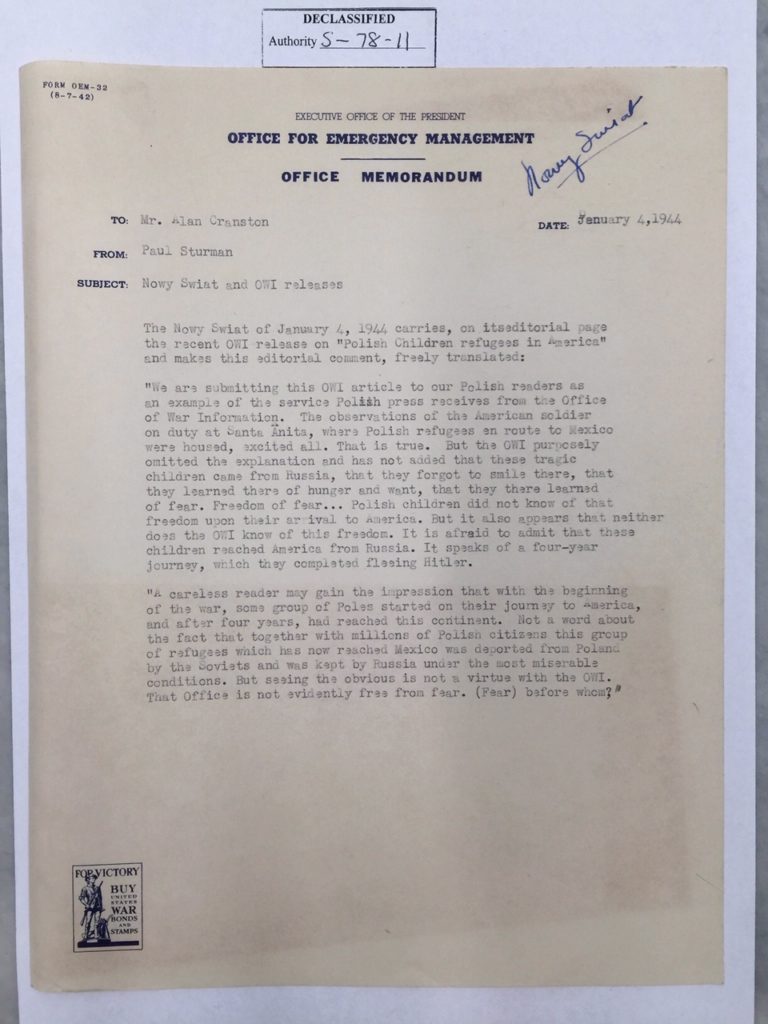
After the war, Cranston was called to testify before the bipartisan Madden Committee investigating the Katyn massacre. In its Final Report in 1952, the committee condemned his involvement in illegal attempts to silence Polish American radio stations for broadcasting true information about Soviet Russia.
Our committee concludes that the staff members of the Office of War Information and Federal Communications Commission who participated in the program of silencing Polish radio commentators went beyond the scope of their duties as official Government representatives. Actually, they usurped the functions of the Office of Censorship and by indirect pressure accomplished domestic censorship which was not within the jurisdiction of either of these agencies.[ref]Select Committee to Conduct an Investigation of the Facts, Evidence and Circumstances of the Katyn Forest Massacre, Final Report, (Washington: United States Government Printing Office, 1952), p. 12, http://kresy-siberia.com/1952_Katyn_report_to_Congress.pdf.[/ref]
Somewhat earlier, OWI Director Elmer Davis made his own unsuccessful secret attempt to close down the Nowy Świat Polish American newspaper. It is also worth noting that at least one OWI memo referred to ethnic American journalists who exposed Stalin’s crimes as “subversives.”

Congress slashes OWI’s domestic propaganda budget
Already in 1943, the U.S. Congress became deeply concerned about the OWI’s domestic propaganda activities. In bipartisan votes, the House of Representatives and the Senate drastically reduced OWI’s domestic operations budget, forcing it to stop producing propaganda materials for U.S. media consumption.[ref]Allan M. Winkler, The Politics of Propaganda: The Office of War Information, 1942-1945, Yale Historical Publications : Miscellany 118 (New Haven: Yale University Press, 1978), pp. 70-71.[/ref] The 1945 United States Government Manual shows that with whatever little money was left for domestic activities, the Office of War Information still managed to keep the senior bureaucratic positions in its Domestic Operations Branch. However, a description provided by the Office of War Information to justify its funding request in the war supplement to the 1945 fiscal year budget noted the congressional action to slash its domestic operations and most of its staff producing propaganda materials for distribution in the United States.

Domestic Branch.—By action of Congress, all production was eliminated from the program of the Domestic Branch, and its function became one of consultation and advice. The primary objective of this program is to prevent conflicts and overlapping in the war information campaigns of all Government agencies, and to enlist the support of the radio, motion picture, book and magazine, and specialized press industries in support oi those campaigns. A small staff is also provided to review and to eliminate unnecessary Government informational publications, and to service OWI and the Government as a whole with press clippings, public informational surveys, and a central public inquiries activity. The program for 1945 contemplates a continuation of these activities at the level established at the end of fiscal year 1944. The decrease in the 1945 budget is accounted for by the elimination of funds in the 1944 appropriation for the liquidation of certain activities.
Overseas Branch.—The program of the Overseas Branch includes information activities in allied and neutral countries, and psychological warfare activities which are carried out in conjunction with the military forces of the United States. The purpose of the information activities is to present facts about the contribution of the United States to the war. The psychological warfare activities cover pre-invasion, actual combat, and post-invasion phases. For the accomplishment of its objectives, the Office of War Information uses publications, radio, motion pictures, exhibit displays and other media with an organization of outposts abroad as distribution centers. The entire increase in the I945 estimate in comparison with the I944 appropriation is to provide for the psychological warfare program that is being developed in conjunction with the military. This program is expected to require considerable expansion of production in the United States is well as greatly accelerated activities abroad. The information program in allied and neutral countries is being maintained at the 1944 level.[ref]The Budget of the United States For The Fiscal Year Ending June 30 1945: War Supplement (Washington: Government Printing Office, 1945), p. 34.[/ref]
The heavy emphasis was placed in the 1945 OWI budget request on developing psychological warfare operations with the U.S. military suggested an attempt to expand the mission and get new funding. OWI director Elmer Davis also hoped to take control of the German media in the U.S. occupational zone, but his plan was shut down by General Eisenhower. President Truman agreed with Eisenhower and subsequently abolished Davis’ agency, eliminating its remains domestic informational and propaganda activities and moving the Voice of America radio broadcasting operations and all other overseas media outreach and public diplomacy activities to the State Department.
The Madden Committee condemns censorship by OWI and VOA
As the Cold War intensified, Truman and more members of Congress from both parties concluded that the Office of War Information and the wartime VOA broadcasts had been tainted by Soviet propaganda that harmed America’s long-term international reputation, its national interests, and security. The agency was doomed by the incompetence of its leadership, their ideological fascination with Soviet Russia, poor security, which allowed the hiring of Communists and other radicals, and ultimately Stalin’s betrayal of the empty promises he made to Roosevelt and Churchill at Teheran and Yalta to get their approval for border changes and for Russia’s dominance over Eastern Europe. The bipartisan Select Committee of the House of Representatives to Conduct an Investigation and Study of the Facts, Evidence and Circumstances of the Katyn Forest Massacre, also known as the Madden Committee after its chairman Ray J. Madden (D-Indiana), said in its final report issued in December 1952:
In submitting this final report to the House of Representatives, this committee has come to the conclusion that in those fateful days nearing the end of the Second World War there unfortunately existed in high governmental and military circles a strange psychosis that military necessity required the sacrifice of loyal allies and our own principles in order to keep Soviet Russia from making a separate peace with the Nazis.[ref]Select Committee to Conduct an Investigation and Study of the Facts, Evidence and Circumstances of the Katyn Forest Massacre, The Katyn Forest Massacre: Final Report (Washington: United States Government Printing Office, 1952), pp. 11-13, https://archive.org/details/KatynForestMassacreFinalReport.[/ref]
The committee added:
For reasons less clear to this committee, this psychosis continued even after the conclusion of the war. Most of the witnesses testified that had they known then what they now know about Soviet Russia, they probably would not have pursued the course they did. It is undoubtedly true that hindsight is much easier to follow than foresight, but it is equally true that much of the material which this committee unearthed was or could have been available to those responsible for our foreign policy as early as 1942.[ref]Ibid.[/ref]
The Madden Committee also said in its final report in 1952:
This committee believes that if the Voice of America is to justify its existence, it must utilize material made available more forcefully and effectively.[ref]Ibid.[/ref]
Members of Congress criticized Elmer Davis for his role in enabling the spread of Soviet fake news through the Voice of America, but later the whole incident was forgotten and became part of the Katyn cover-up. The bipartisan select committee of the House of Representatives, which conducted the investigation of the Katyn Forest massacre, concluded in 1952 that Davis was responsible for repeating false Soviet propaganda through the Voice of America and domestic radio networks in the United States.
Mr. Davis, therefore, bears the responsibility for accepting the Soviet propaganda version of the Katyn massacre without full investigation. A very simple check with either Army Intelligence (G- 2) or the State Department would have revealed that the Katyn massacre issue was extremely controversial.[ref]Ibid., p. 9.[/ref]
Soviet influence over WWII Voice of America
Pressed about charges of communist influence, Davis told the Madden Committee in 1952 that about a dozen Communists were fired from OWI jobs while he was the OWI Director.[ref]Ted Lipien, “Voice of America Polish Writer Listed As His Job Reference Stalin’s KGB Agent of Influence Who Duped President Roosevelt,” Cold War Radio Museum (blog), February 12, 2020, http://www.coldwarradiomuseum.com/voice-of-america-polish-editor-listed-stalins-kgb-agent-of-influence-as-job-reference/.[/ref] Davis was not as radically pro-Soviet as some of his senior aides and he wanted to avoid unnecessary confrontations with members of Congress. According to U.S. Representative and later Senator Karl E. Mundt (R- South Dakota), Davis issued a statement in 1942, saying that “You can oppose communism in the United States without being disloyal to Russia’s fight against the Nazis. Everyone knows that Russia is a strong ally and hopes that she licks the Germans.” But Davis added that “It is a matter of law that you can’t have Communists in the United States Government and it is a matter of common sense that you don’t want party liners in it either.”
Rep. Mundt praised Davis in a speech in the House of Representatives on July 24, 1942, “Mr. Davis is dead right in his clear-cut distinction between helping the Russians abroad and condoning and encouraging communism at home. The former is in our national interests; the latter leads to our national destruction.”[ref]Karl E. Mundt, “Head of Office of War Information Warns America Against Communist Propaganda,” 77th Congress, Second Session, Volume 88 – Part 9, Congressional Record – Appendix, July 24, 1942, p. A2953.[/ref] Ten years later, in the early 1950s, Davis became one of the most outspoken critics of Senator Joseph McCarthy (R-Wisconsin) for his destructive and futile anti-communist investigations. There were no communist “subversives,” agents, or spies employed by the Voice of America in the early 1950s. They all had left or were forced out – some already during the Roosevelt administration, and the rest were fired or left during the Truman administration. The Soviets did not take full control over the Office of War Information and the Voice of America during World War II and in the immediate post-war period, but that was not their intention. They still managed to dupe OWI officials and VOA journalists to support their strategic political goals and to spread their disinformation to Americans and foreign audiences.
Concerns about foreign influence within the OWI and domestic government propaganda were growing as the war against Germany and Japan progressed and Soviet Russia’s imperial ambitions were becoming more difficult to hide, despite the efforts of the OWI propagandists to hide them and present Stalin as a supporter of democratic elections. After President Truman abolished the OWI in 1945 to stop criticism and prevent new scandals, post-war legislation, passed with bipartisan support, introduced much more stringent security and background checks for the Voice of America employees under the administrative umbrella of the State Department. The legislation that strengthened personnel security measures, the Smith-Mundt Act of 1948, which was designed primarily to foster U.S. information activities overseas and academic exchanges, also effectively prevented the distribution of VOA programs in the United States.
Six decades later, the Smith–Mundt Modernization Act of 2012 made it easier for the Voice of America and its current parent agency, the U.S. Agency for Global Media, to make its programs available in the United States, raising new concerns that government officials and government-employed journalists will be able to propagandize to Americans. Voice of America journalists did prior to the 2016 and 2020 U.S. elections by violating the VOA Charter and posting on VOA digital platforms campaign videos in favor of the Democratic Party presidential candidates. [ref]”2016 Election Voice of America VOA Ukraine Service De Niro Video Attacking Trump,” YouTube, https://youtu.be/CGDVUOyQJAM. “Voice of America VOA Urdu Service Joe Biden appeal for Muslim vote video,” YouTube, https://youtu.be/r2iL0uy6iL8.[/ref]
Walter Lippmann and Eugene Lyons comment on VOA
During the Cold War, liberal American journalists like Walter Lippmann, founding editor of New Republic and Pulitzer Prize winner, questioned the usefulness of the Voice of America and the U.S. government’s involvement in such broadcasts.
It will be said, I know, that if we abolish the Voice of America, if we limit our broadcasts to straight news, that we shall “lose the battle for men’s minds to the Communist [sic] who conduct incessant propaganda. I do not think there is any evidence that the Voice of America has been winning that battle. On the contrary, there are all sorts of reasons, I believe, for thinking that it does more harm than good to our influence abroad.”[ref]Walter Lippmann, “The Voice of America Should Be Abolished,” Los Angeles Times, April 29, 1953. Accessed on John Brown’s Notes and Essays (blog), September 30, 2014, http://johnbrownnotesandessays.blogspot.com/2014/09/walter-lippmann-voice-of-america-should.html.[/ref]
Lippmann would have been right in his assessment several years earlier, but by 1953, there was already a new group of anti-communist journalists and experts, both American and foreign-born, working for VOA. Lippmann did not trust them not to create their own propaganda. They were, however, subject to much stricter security checks and policy control at the State Department after the war than were the pro-Soviet VOA officials and journalists who had worked for the Office of War Information, where Voice of America broadcasts originated from 1942 until 1945.
Lippmann’s column, titled “Why the Voice of America Should Be Abolished” appeared in the Los Angeles Times, the New York Herald Tribune, and was condensed and reprinted in the August 1953 issue of Reader’s Digest. Lippmann wrote that
For ANY Government agency to call itself the Voice of America is an impertinence.[ref]Walter Lippmann, “Why the Voice of America Should Be Abolished,” Reader’s Digest, August 1953. Condensed from New York Herald Tribune.[/ref]
The 1945 U.S Government Manual may have started the official use of the “Voice of America” name for the World War II-era U.S. government broadcasts, which were soon to be transferred to the State Department in the hope of being better supervised. An earlier reference to the “Voice of America” name appeared in print in 1943 in a socialist propaganda pamphlet published outside the Office of War Information by OWI employees. The pamphlet advocated for radical socialism in Poland and good relations with the Soviet Union. It was most likely written with the approval of senior OWI officials and possibly with OWI funding. Some of these employees, who worked on producing wartime Voice of America broadcasts, later joined communist governments in East-Central Europe as anti-American propagandists and diplomats.
They may have been the “subversives,” mentioned by an American journalist, Eugene Lyons, in a 1954 Reader’s Digest article:
Without doubt some “subversive” individuals formerly found their way into VOA, as into other agencies in Government. Fortunately the Voice has cleared house. Ardent anti-Communists on the inside are now convinced that no known Communists or Communist sympathizers remain.[ref]Eugene Lyons, “How Good Is the Voice of America,” Reader’s Digest, June 1954, p. 91.[/ref]
Lyons worked in the Soviet Union in the 1930s, was initially pro-Soviet, and he once interviewed Joseph Stalin, but later he become a strong critic of Communism and Soviet Russia.
In the conclusion of his 1954 Reader’s Digest article, Eugene Lyons wrote:
That the Voice has shortcomings is admitted. But the remedy is not to destroy this one official channel for reaching the freedom-loving peoples of the world. The remedy is to improve and strengthen the Voice.[ref]Ibid. p. 92.[/ref]
Socialist pamphlet with possibly first use of “Voice of America” name in print
The 1943 socialist propaganda pamphlet, which mentioned “the Voice of America,” included some true information about the German occupation of Poland but also many misleading claims about the significance of U.S. government’s international broadcasts within the country. The BBC was by far the main source of international news for the underground newspapers in Poland. The Poles living under the German occupation or as refugees in the West and Poland’s democratic government-in-exile in London criticized VOA broadcasts for following the Soviet propaganda line and sounding not much different from Radio Moscow.
Czesław Straszewicz, a Polish journalist based in London during the war, did not have a very high opinion of VOA’s wartime broadcasts to Poland, as he put it, “whatever name they had then.”[ref]Czesław Straszewicz, “O Świcie,” Kultura, October, 1953, 61-62. I am indebted to the Polish historian of the Voice of America’s Polish Service Jarosław Jędrzejczak for finding this reference to VOA’s wartime role.[/ref]
With genuine horror we listened to what the Polish language programs of the Voice of America (or whatever name they had then), in which in line with what [the Soviet news agency] TASS was communicating, the Warsaw Uprising was being completely ignored.[ref]Ibid.[/ref]
OWI and VOA presented Soviet Russia as having a progressive socialist government and Stalin as a radical leader but one who would protect peace and democracy after the war. Many VOA senior officials and journalists also believed that Stalin would guarantee religious freedom.[ref]Ted Lipien, “Voice of America Polish Service Broadcaster Irene Broni Resisted Nazis and Communists,” Cold War Radio Museum (blog), July 15, 2018, http://www.coldwarradiomuseum.com/voice-of-america-polish-service-broadcaster-irene-broni-resisted-nazis-and-communists/.[/ref] In fighting Hitler and Fascism they embraced another mass murderer and an ideology based on class and group hatred.
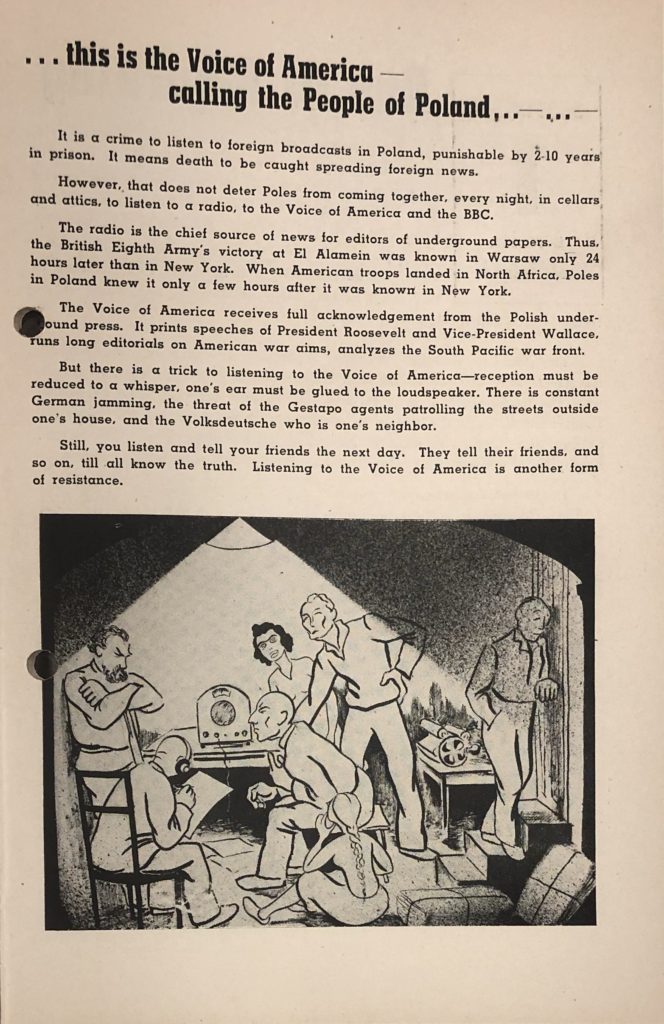
One of the OWI and VOA employees who wrote the 1943 socialist booklet with references to the Voice of America broadcasts was Stefan Arski, aka Artur Salman. He resigned in 1947 from the State Department, where he was transferred from the OWI immediately after World War II, and joined the Communist Party in Poland. In his career as a communist regime journalist, he was especially active in denouncing the U.S. government, condemning Radio Free Europe, and supporting Soviet propaganda lies about the Katyn massacre.[ref]Ted Lipien, “Voice of America Polish Writer Listed As His Job Reference Stalin’s KGB Agent of Influence Who Duped President Roosevelt,” Cold War Radio Museum (blog), February 12, 2020, http://www.coldwarradiomuseum.com/voice-of-america-polish-editor-listed-stalins-kgb-agent-of-influence-as-job-reference/.[/ref] He collaborated with a Polish communist spy, Zbigniew Brydak, aka Stefan Michalski, who had worked for a short time at the Munich Bureau of the Voice of America in the early 1950s and is believed to be responsible for the deaths of several young men in Poland whom he denounced to the communist authorities. He tried but failed to secure a full-time position with Radio Free Europe’s Polish Service.[ref]Marek Walicki, Z Polski Ludowej do Wolnej Europy (Warszawa: Bellona Spółka Akcyjna, 2018), pp. 170-182.[/ref] The Truman administration replaced Arski and other pro-Soviet VOA foreign language broadcasters with anti-communist refugee journalists and made broadcasts more critical of the Soviet Union. The Truman administration also replaced VOA and State Department officials who favored a softer approach to broadcasting to the USSR.
While VOA never became as hard-hitting and relevant on local news as Radio Free Europe, its broadcasts did contribute in the later years of the Cold War to the fall of communism in the Soviet Bloc, especially during the Reagan administration in the 1980s.[ref]Ted Lipien, “Voice of America Polish Service Journalists Accused of Being Anti-Communist Reagan Saboteurs,” Cold War Radio Museum (blog), February 27, 2021, http://www.coldwarradiomuseum.com/voice-of-america-polish-service-journalists-accused-of-being-anti-communist-reagan-saboteurs/.[/ref]
First “Voice of America” director forced out for hiring Communists
United States Government Manual – 1945 stated that the Communications Facilities Bureau:
Provides and maintains for the Overseas Operations Branch a world-wide network of communications to carry the “Voice of America” by radio and the written word by cable and wireless to every important propaganda target throughout the world.[ref]Elmer Davis, “Office of War Information,” United States Government Manual – 1945, First Edition (Washington: Office of War Information, 1945), p. 94.[/ref]
Programming and management scandals at the Office of War Information and the Voice of America during the war years led to the forced resignation in 1943 of John Houseman, the future Hollywood actor who was declared later, somewhat erroneously, to have been the first VOA director, although his job was the chief radio producer, while program content was determined by Robert E. Sherwood and a pro-Soviet fellow traveler journalist, Joseph F. Barnes. Because the OWI’s and VOA’s leadership was chaotic and ineffective, the U.S. State Department, not exactly anti-Soviet at the time considering that the Soviet Union was then America’s major military ally against Hitler, refused to issue Houseman a U.S. passport for his planned official trip on VOA’s business to Europe. He resigned shortly afterward. The State Department official who warned the White House about Soviet influence over Voice of America broadcasts, and specifically about John Houseman, was President Roosevelt’s personal friend and foreign policy advisor, Under Secretary of State Sumner Welles, a person of liberal but not pro-Soviet or pro-communist views.[ref]Ted Lipien, “First VOA Director Was a Pro-Soviet Communist Sympathizer, State Dept. Warned FDR White House,” Cold War Radio Museum (blog), May 5, 2018, http://www.coldwarradiomuseum.com/state-department-warned-fdr-white-house-first-voice-of-america-director-was-hiring-communists/. Under Secretary of State Sumner Welles April 6, 1943 memorandum to Marvin H. McIntyre, Secretary to the President with enclosures, Franklin D. Roosevelt Library and Museum Website, Box 77, State – Welles, Sumner, 1943-1944. From Collection: FDR-FDRPSF Departmental Correspondence, Series: Departmental Correspondence, 1933 – 1945 Collection: President’s Secretary’s File (Franklin D. Roosevelt Administration), 1933 – 1945, National Archives Identifier: 16619284.[/ref]

The only incorrect statement about John Houseman in the attachment to the memorandum Under Secretary of State Sumner Welles sent to the Roosevelt White House in April 1943 was the description of Native Son as “subversive” and “un-American.” Its author, African American writer Richard Wright, made a break with Communism and wrote about it in The God that Failed, a 1949 collection of six essays by Louis Fischer, André Gide, Arthur Koestler, Ignazio Silone, Stephen Spender, and Richard Wright. Native Son (1940) had Communist characters, but it was essentially a book against racism in America.
The memo Under Secretary of State Sumner Welles sent to the FDR White House in April 1943 noted the fascination of some American liberals with Soviet communism and urged finding other liberal individuals – not communist sympathizers – to be put in charge of U.S. government information programs.
If it is desired to give a distinctly liberal cast to these organisations, it would seem possible to find men who are liberal in the light of their own conviction, and of the American ideal, rather than men who have, for one reason or another, elected to give expression to their liberalism primarily by joining Communist front organizations, and apparently sacrificing their independence of thought and action to the direction of a distinctly European movement.[ref]Under Secretary of State Sumner Welles April 6, 1943 memorandum to Marvin H. McIntyre, Secretary to the President with enclosures, Franklin D. Roosevelt Library and Museum Website, Box 77, State – Welles, Sumner, 1943-1944. From Collection: FDR-FDRPSF Departmental Correspondence, Series: Departmental Correspondence, 1933 – 1945 Collection: President’s Secretary’s File (Franklin D. Roosevelt Administration), 1933 – 1945, National Archives Identifier: 16619284. Also see: Ted Lipien, “Howard Fast – Chief of Voice of America News Who Won the Stalin Peace Prize, Voice of America – 80 Years of Hidden History,” Voice of America – 80 Years of Hidden History (blog), accessed January 26, 2022, https://www.voa80.com/2021/12/21/howard-fast-chief-of-voice-of-america-news-who-won-the-stalin-peace-prize/.[/ref]
Sumner Welles also pointed out:
The records of the men involved seem to indicate that should there be a divergence between the policy of the States and the policy of Soviet Russia, these men, with a large degree of control of the American machinery of war making, would probably follow the line taken by Russia, rather than the line taken by the United States.[ref]Ibid.[/ref]
John Houseman may have never formally joined the Communist Party, but he hired his communist friends for VOA jobs. General Dwight Eisenhower considered OWI officials and VOA broadcasters to be insubordinate toward the President of the United States in their desire to promote Soviet interests.[ref]Dwight D. Eisenhower, The White House Years: Waging Peace 1956-1961 (Garden City: Doubleday & Company, 1965) 279.[/ref] His commanders and perhaps Eisenhower himself did not want Houseman doing any kind of propaganda work near their troops in North Africa.[ref]Ted Lipien, “General Eisenhower Accused WWII VOA of ‘Insubordination,’” Cold War Radio Museum (blog), May 14, 2018, https://www.coldwarradiomuseum.com/general-eisenhower-accused-wwii-voa-of-insubordination/.[/ref] The State Department officials reached the same conclusion about Howard Fast when he applied for a passport to travel on VOA business to North Africa. They denied his request.
Early Congressional critics of Voice of America
Since OWI was seen by members of Congress and much of the U.S. media as rudderless and mismanaged, such views may have prompted President Truman to disband the office in 1945. He may have preferred to avoid controversy and criticism over giving government jobs to partisan supporters in an out-of-control agency prone to scandal. Lawmakers of both parties who criticized communist and Soviet influence over VOA programs included conservative and moderate Republicans, segregationist southern Democrats, but also a number of liberal northern Democrats, especially those whose districts had large numbers of voters with family roots in East-Central Europe.
One of the most consistent early congressional critics of Soviet influence at the Voice of America and critic of VOA’s management was Rep. Richard B. Wigglesworth (R-Massachusetts), a Harvard Law School international law expert who later served as the U.S. Ambassador to Canada.[ref]“Voice of America 1951 – ‘Drab’ ‘Unconvincing,’” Cold War Radio Museum (blog), February 24, 2018, https://www.coldwarradiomuseum.com/voice-of-america-1951-drab-and-unconvincing-rep-wigglesworth-quotes-voa-listeners-in-poland/.[/ref] Another congressional critic of the pro-Soviet censorship at VOA was Rep. Philip J. Philbin (D-Massachusetts), a Harvard University and Columbia University Law School graduate.
Alarmed by pro-Soviet and pro-communist propaganda being pushed by U.S. government employees on Americans, Senator Robert A. Taft (R-Ohio) introduced in 1943 a resolution demanding that all OWI materials, including what would later be described as Voice of America broadcasts in English and foreign languages, be made available for inspection by congressional staff and media.[ref]Robert A. Taft, “Disclosure of Government Propaganda Material,” Congressional Record – Senate, April 19, 1943, pp. 3543-3544.[/ref]
Another Democrat, Rep. James A. Wright (D-Pennsylvania), who strongly defended OWI’s Voice of America broadcasts, said that he was deeply pained by Congressman John Lesinski’s Sr. (D-Michigan) criticism because he saw him as “an outstanding liberal and a supporter of the President [Franklin Delano Roosevelt,” as well as a personal friend.[ref]James A. Wright, Congressional Record – House, June 24, 1943, p. 6454.[/ref]
Congressman Wright was a convinced believer in Soviet and OWI propaganda. In criticizing Lesinski and defending the Office of War Information and pro-Soviet VOA broadcasters, Wright said on the floor of the House of Representatives on June 24, 1943, “Every responsible American writer considers the Katyn massacre story an unadulterated Nazi propaganda.” What he said was not true. Edward R. Murrow and several other well-known American journalists reported that the Soviets were most likely the perpetrators of the 1940 mass murder of about 22,000 Polish POW military officers and government officials, including many members of the country’s political and intellectual elite. But Congressman Wright repeated the Soviet message, amplified in the United States and abroad by the Office of War Information and the Voice of America.
Indoctrinated and intimidated by Soviet propaganda, Rep. Wright even advocated against protests and actions in defense of Jewish-Polish socialist leaders, Henryk Ehrlich and Victor Alter. They were both arrested in December 1941 by the Soviet NKVD, charged with spying “for enemies of the Soviet Union,” and were later executed on Stalin’s orders despite appeals for their release from First Lady Eleanor Roosevelt and Albert Einstein. Wright said that such protests would be “a serious affront to our ally, the Soviet Government, which might have been of sufficient gravity to have caused the severance of our relations with them.” For some radically left-leaning Americans in the 1940s, including many VOA officials and journalists, Soviet Russia was the land of social progress and Stalin could do no wrong. The Voice of America also failed to report sufficiently on the Jewish Holocaust, while the Office of War Information produced propaganda films in support of the illegal internment of Japanese Americans, modeled in concept, although not in deaths and cruelty, after Stalin’s deportations of ethnic groups to the Gulag.
American scholar Holly Cowan Shulman wrote in a 1997 article published in Historical Journal of Film, Radio and Television that “the Voice of America – the United States Government overseas radio broadcasting station founded in 1942 – ignored the subject of the Holocaust throughout the Second World War.” She is the daughter of the second VOA director, Lou Cowan who, according to Howard Fast, wrote in 1944 a highly complimentary official farewell letter to Fast, praising his contributions to VOA. Holly Cowan Shulman noted that U.S. government officials in charge of VOA were “either Jewish or philo-Semites,” but the radio station during World War II “said very little about the persecution of the Jews of Europe at all.”[ref]Holly Cowan Shullman, “The Voice of America, US Propaganda and the Holocaust: ‘I Would Have Remembered’,” Historical Journal of Film, Radio & Television 17, no. 1 (March 1997), pp. 91-103.[/ref]
Rep. Wright and OWI propagandists were, of course, tragically wrong about Stalin, Soviet Russia, and their own propaganda, including Voice of America broadcasts. Rep. Lesinski was right.
Still, the then-former OWI director Elmer Davis told a bipartisan investigative committee of the U.S. House of Representatives in 1952 that Congressman Lesinski was lying about his former agency’s failures. Lesinski did not say anything that was not true, but by then he was no longer alive to respond to Davis’ attack on his reputation.
Committee members were not impressed with Davis and treated him rather harshly, requiring him to read out loud his 1943 broadcast in support of the Soviet disinformation about Katyn. Davis admitted under questioning by members of Congress that he was duped by Soviet disinformation but tried to minimize his mistakes. His government job was to combat disinformation. Instead, he and the OWI censored truthful news according to their own ideological and institutional preferences, and possibly in response to secret directives from the White House. Davis denied that he received any directives from President Roosevelt.
Davis’ 1943 Katyn commentary may have reflected what he naively believed to be true. More likely, he knew the truth but chose to say what President Roosevelt expected him to say. They may have both agreed that lying about Katyn was at that moment in America’s interest to protect the military alliance with the Soviet Union. The Madden Committee seemed willing to accept the military necessity argument but did not accept the need for it after the war and the need for actively supporting Soviet propaganda in Voice of America broadcasts and in other official U.S. government communications at any time.
Rep. Leon H. Gavin (R-PA) calls for abolishing OWI
In 1945, President Truman put the Voice of America under the control of the U.S. State Department, which — earlier — unsuccessfully tried to warn Davis and other OWI and VOA executives to at least show restraint and not to fall for the most egregious World War II Soviet propaganda lie.
What finally killed the Office of War Information and its domestic propaganda and illegal censorship activities was the incompetence and arrogance of its director Elmer Davis when he tried to extend the OWI’s reach in post-war Germany and received an angry reaction from General Dwight Eisenhower who was then the Military Governor of the U.S. Occupation Zone. The controversy was outlined in Congress by Representative Leon H. Gavin (R-Pennsylvania) on May 18, 1945 and reported by U.S. media. Congressman Gavin inserted in the Congressional Record the text of a column by John O’Donnell in the Washington Times-Herald about Davis’ confrontation with General Eisenhower and the rebuke Davis received from President Truman. Gavin was born in Buffalo, New York, served in World War I, and was later a U.S. Representative from Pennsylvania from 1943 to 1963. He was a moderate Republican who voted for the civil rights legislation in the 1950s and the early 1960s.
Office of War Information
REMARKS OF
HON. LEON H. GAVIN
OF PENNSYLVANIA
IN THE HOUSE OF REPRESENTATIVESFriday, May 18, 1945
Mr. GAVIN. Mr. Speaker, a grand opportunity awaits the Members of Congress when the $50,000,000 appropriation comes up for the Office of War Information. This war agency should be abolished to save $50,000,000 for the taxpayers and a lot of headaches to the American people.
On Monday, June 21, 1943, I stated on the floor of the House:
Now along comes Director Davis—and I am referring to O. W. I. Elmer Davis—and threatens to resign unless Congress restores the funds to the domestic branch of O. W. I. If he wants to resign, he can resign, and I know the press will be only too pleased to record It under the heading of public Improvements.
What I said then still goes now—double for the whole O. W. I. set-up. Mark me, there will be no threats to resign this time. The last suggestion made by O. W. I. Elmer Davis to bar henceforth all American newspapers and magazines from occupied Germany, a proposal that was vetoed by General Eisenhower and President Truman, is evidence enough to the Members of this Congress that this $50,000,000-a-year program should be blotted out and the O.W.I. definitely taken out of the picture and war propaganda turned over to the Army and Navy, where it belongs, and the distribution of domestic Information back to the various departments of the Government.
Here is an opportunity to save $50,000,000 for the boys who are doing the fighting—boys who will come home to go to work to earn the money to pay the taxes to pay this wartime bill. When this appropriation bill for O. W. I. comes up, let us give the boys a break and take a lot of literary genius out of lush pasture and let them go to work.
Certainly, it is one of the wartime agencies that has outlived its usefulness and one that will never be missed—will never be missed.[ref]Leon H. Gavin, “Office of War Information,” Appendix – Congressional Record (Bound Edition), Volume 91 (1945), p. A2378, https://www.govinfo.gov/app/details/GPO-CRECB-1945-pt11/GPO-CRECB-1945-pt11-1.[/ref]
Quoting from John O’Donnell’s column in the Washington Times-Herald, Rep. Gavin explained the reasons for the conflict between General Eisenhower and Elmer Davis, and President Truman’s reaction. General Eisenhower was already negatively disposed toward the Office of War Information because of a Voice of America broadcast in 1943 which, following the line of Moscow-supported Communists, put the lives of American soldiers in Italy at risk by attempting to undermine Eisenhower’s military strategy in trying to get the support of the King of Italy for abandoning the alliance with Nazi Germany.
Elmer Davis apparently suggested to reporters in May 1945 that the U.S. military authorities had agreed with him that U.S. newspapers and magazines should not be distributed in Germany and instead all American news for Germany should be prepared by OWI specialists. John O’Donnell wrote in the Washington Times-Herald that General Eisenhower and President Truman did not know about it and did not agree with Davis.
General Eisenhower, of course, had never heard of the Army policy barring American newspapers from Germany as announced by Davis until President Truman, moving with simple directness and common sense, called him up and asked the facts.
The blunt statement which Truman, standing before a group of White House reporters read with such crisp vigor, was the harshest indictment yet made of O. W. I. He read:
“General Eisenhower has advised me that he has issued no policy or order dealing with the importation of publications into Germany.”
In other words, the Information handed out by the head of the Office of War Information was 100-percent wrong.
The Agency, set up under Davis and given millions to spend, was created to assure “an accurate and consistent flow of war Information to the public and the world at large.”[ref]Ibid., p. A2379.[/ref]
John O’Donnell ended his column with a harsh condemnation of the OWI.
The idea that if you’re handling news and information, it might be a good idea to have a few competent newspapermen around never got very far In O. W. I.
A few respectable members of the craft were lured into the Davis set-up to give it the window-dressing of journalistic respectability. But they were few, and most of them quit in disgust.
In all decency, they couldn’t stand the phony atmosphere created by the breast-beaters and psychopathic crackpots, the sweepings of editorial rooms, the draft dodgers who battled to get on the O. W. I. payroll, and the slobbering do-gooders and world-savers.
O. W. I., of course, wants to keep its gentry on the payroll for as long as possible. But, viewing yesterday’s developments, we think some of the boys might be looking around for a Job—or possibly the younger and healthier having a heart-to-heart talk with their draft boards.[ref]Ibid.[/ref]
On May 24, 1945, Representative Gavin inserted in the Congressional Record more U.S. newspaper articles calling for the disbanding of the Office of War Information. President Truman had already proposed to cut the OWI budget from $58,000,000 to $42,000,000 (approx.$941,800,00 – $682,000,000 in 2022), but an editorial in the Washington Daily News on May 22, 1945 called for the OWI to be abolished.
Until President Truman and General Eisenhower called a halt, it even joined in a scheme to bar privately published American and British newspapers from occupied Germany.
The American people don’t want Government owned and operated newspapers and radio stations in this country. They would distrust the information and opinion thus transmitted, justifiably suspecting it as propaganda. The Germans and Japs would recognize the OWI output as propaganda. They would conclude that our democracy plays the same game as their tyrannies. Much better let people in the occupied countries publish such newspapers and operate such radios as they can afford, at their own expense, under strict Allied military censorship and control.
At home or abroad, there is no good reason for continuing the OWI. Its usefulness, if any, has ended. Abolish it.[ref]Washington Daily News editorial of May 22, 1945 inserted in Appendix – Congressional Record (Bound Edition), Volume 91 (1945), p. A2378, https://www.govinfo.gov/app/details/GPO-CRECB-1945-pt11/GPO-CRECB-1945-pt11-1.[/ref]
U.S. Agency for Global Media requested budget for the fiscal year 2022, which does not include public diplomacy activities also performed by the OWI during World War II, is $810,400,000. USAGM spends now about the same amount on international media outreach alone as the United States government spent during wartime on radio broadcasts, film and print propaganda, and public diplomacy programs at home and abroad.
In his Executive Order 9608 issued on August 31, 1945, President Truman abolished the functions of the Office of War Information, and ordered the transfer of radio broadcasting operations to the State Department, effective September 15, 1945, with the final elimination of the Office of War Information, including the office of the Director of the Office of War Information, effective December 31, 1945.
President Truman’s Executive Order 9608 abolishing OWI
PROVIDING FOR THE TERMINATION OF THE OFFICE OF WAR INFORMATION, AND FOR THE DISPOSITION OF ITS FUNCTIONS AND OF CERTAIN FUNCTIONS OF THE OFFICE OF INTER-AMERICAN AFFAIRS
By virtue of the authority vested in me by the Constitution and Statutes, including Title I of the First War Powers Act, 1941, and as President of the United States, it is hereby ordered as follows:
1. Effective as of the date of this order:
(1) There are transferred to and consolidated in an Interim International Information Service, which is hereby established in the Department of State, those functions of the Office of War Information (established by Executive Order No. 9182 of June 13, 1942), and those informational functions of the Office of Inter-American Affairs (established as the Office of the Coordinator of Inter-American Affairs by Executive Order No. 8840 of July 30, 1941 and renamed as the Office of Inter-American Affairs by Executive Order No. 9532 of March 23, 1945), which are performed abroad or which consist of or are concerned with informing the people of other nations about any matter in which the United States has an interest, together with so much of the personnel, records, property, and appropriation balances of the Office of War Information and the Office of Inter-American Affairs as the Director of the Bureau of the Budget shall determine to relate primarily to the functions so transferred. Pending the abolition of the said Service under paragraph 3(a) of this order, (1) the head of the Service, who shall be designated by the Secretary of State, shall be responsible to the Secretary of State or to such other officer of the Department s the Secretary shall direct, (2) the Service shall, except as otherwise provide in this order, be administered as an organizational entity in the Department of State, (3) the Secretary may transfer from the Service, to such agencies of the Department of State as he shall designate or establish, any function of the Service, and (4) the Secretary may terminate any function of the Service, in which event he shall provide for the winding up of the affairs relating to any function so terminated.
(b) There are transferred to the Bureau of the Budget the functions of the Bureau of Special Services of the Office of War Information and functions of the Office of War Information with respect to the review of publications of Federal agencies, together with so much of the personnel, records, and property, and appropriation balances of the Office of War Information as the Director of the bureau of the Budget shall determine relate primarily to the said functions.
(c) All those provisions of prior Executive orders which are in conflict with this order are amended accordingly. Paragraph 6 of the said Executive Order No. 8840 and paragraphs 3, 6, and 8 of the said Executive Order No. 9182 are revoked.
2. Effective as of the close of business September 15, 1945:
(a) There are abolished the functions of the Office of War Information then remaining.
(b) The Director of the Office of War Information shall, pending the abolition of the Office of War Information under paragraph 3(b) of this order, proceed to wind up the affairs of the Office relating to such abolished functions.
3. Effective as of the close of business December 31, 1945:
(a) The Interim International Information Service, provided for in paragraph 1(a) of this order, together with any functions then remaining under the Service, is abolished.
(b) The Office of War Information, including the office of the Director of the Office of War Information, is abolished.
(c) There are transferred to the Department of the Treasury all of the personnel, records, property, and appropriation balances of the Interim International Information Service and of the Office of War Information then remaining, for final liquidation, and so much thereof as the Director of the Bureau of the Budget shall determine to be necessary shall be utilized by the Secretary of the Treasury in winding up all of the affairs of the Service.
HARRY S. TRUMAN
THE WHITE HOUSE,
August 31, 1945[ref]“EXECUTIVE ORDER 9608 | Harry S. Truman,” National Archives, Harry S. Truman Library and Museum, accessed June 17, 2022, https://www.trumanlibrary.gov/library/executive-orders/9608/executive-order-9608.[/ref]
Images from United States Government Manual – 1945
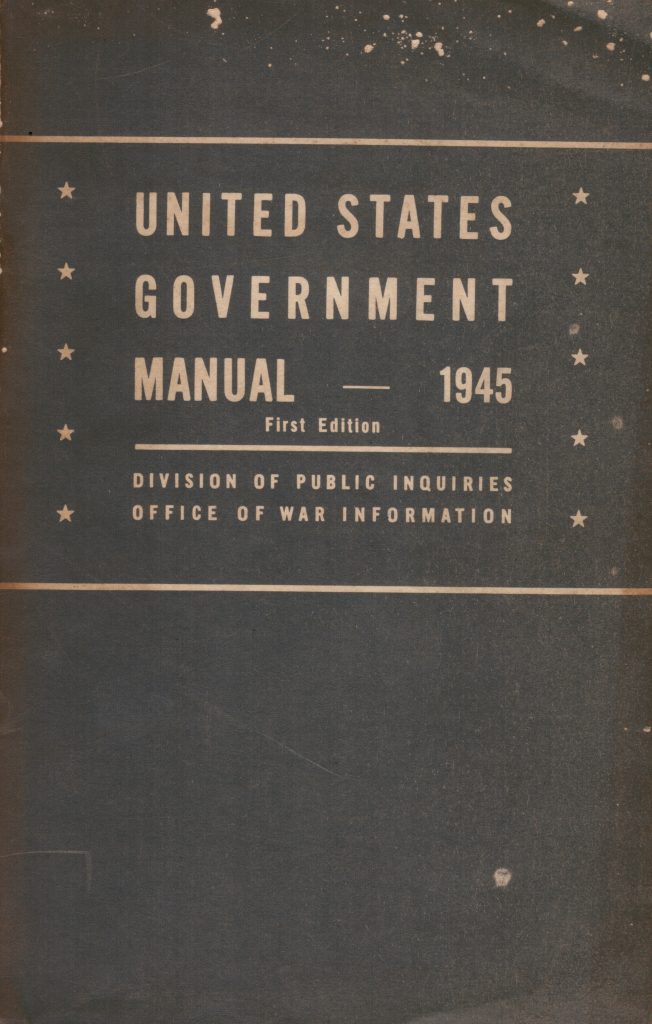
United States Government Manual – 1945 (March) First Edition, Division of Public Inquiries, Office of War Information, Washington, DC, Government Printing Office. The manual includes an early, possibly the first, official reference to “he “Voice of America” name. An earlier reference to “Voice of America” in print appeared in 1943 in a socialist propaganda pamphlet advocating for socialism in Poland and good relations with the Soviet Union, which was published privately by OWI employees, but most likely with the approval and possibly funding from the OWI. Some of these employees worked on Voice of America broadcasts and later joined communist governments in East-Central Europe as anti-American propagandists and diplomats. 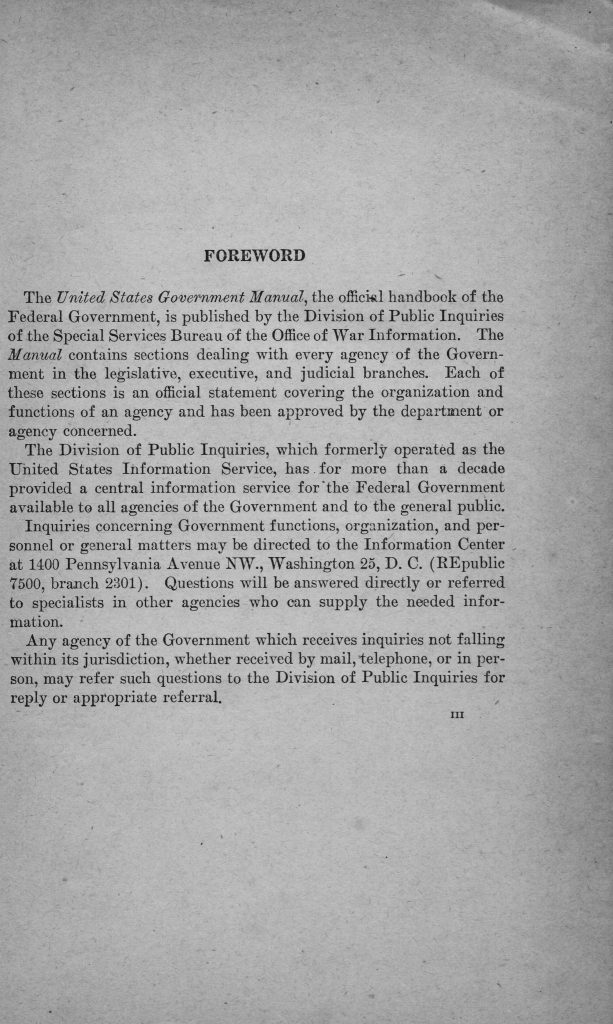
Official information about the Office of War Information (OWI) and the Office of Censorship as of March 1945 in United States Government Manual – 1945, First Edition, published by the Division of Public Inquiries, Office of War Information, Washington, DC, Government Printing Office 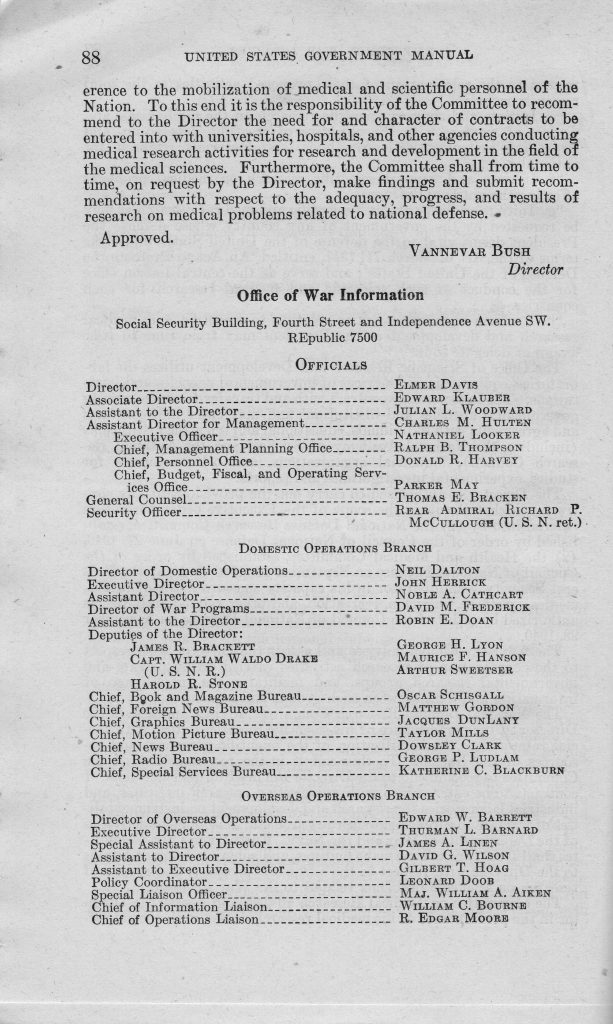
Official information about the Office of War Information (OWI) and the Office of Censorship as of March 1945 in United States Government Manual – 1945, First Edition, published by the Division of Public Inquiries, Office of War Information, Washington, DC, Government Printing Office 
Official information about the Office of War Information (OWI) and the Office of Censorship as of March 1945 in United States Government Manual – 1945, First Edition, published by the Division of Public Inquiries, Office of War Information, Washington, DC, Government Printing Office 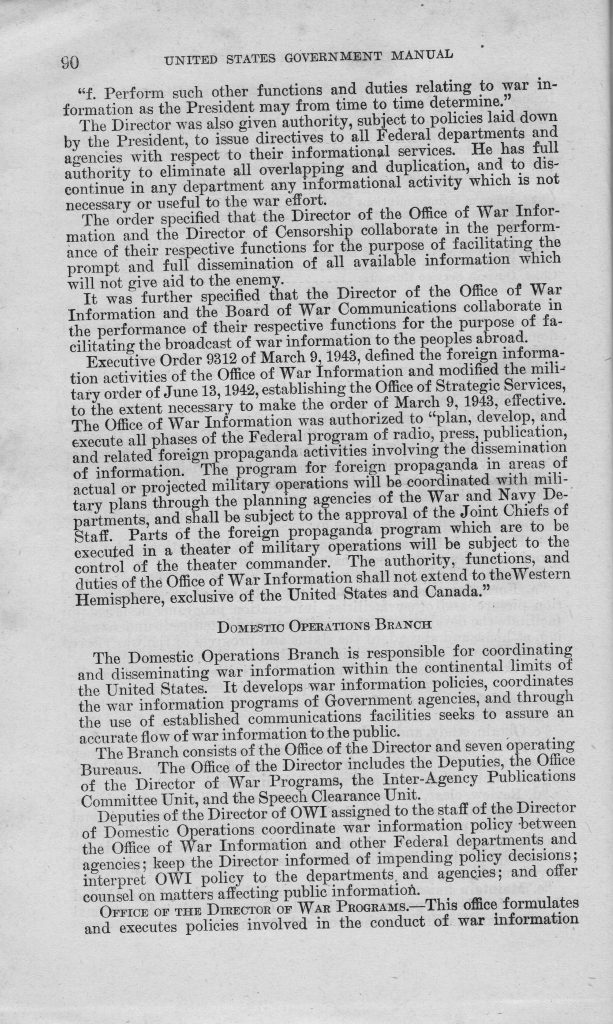
Official information about the Office of War Information (OWI) and the Office of Censorship as of March 1945 in United States Government Manual – 1945, First Edition, published by the Division of Public Inquiries, Office of War Information, Washington, DC, Government Printing Office 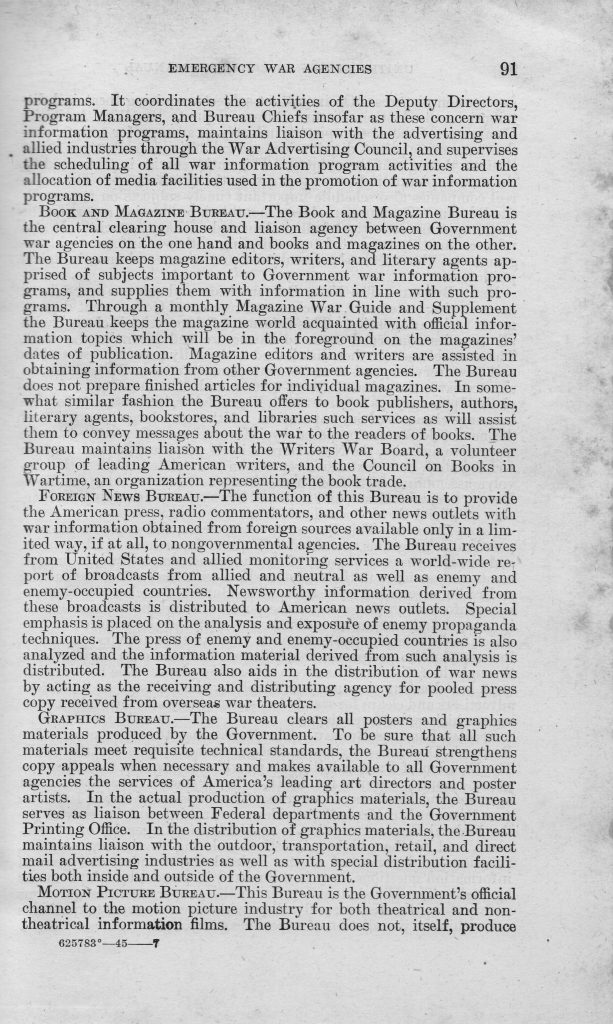
Official information about the Office of War Information (OWI) and the Office of Censorship as of March 1945 in United States Government Manual – 1945, First Edition, published by the Division of Public Inquiries, Office of War Information, Washington, DC, Government Printing Office 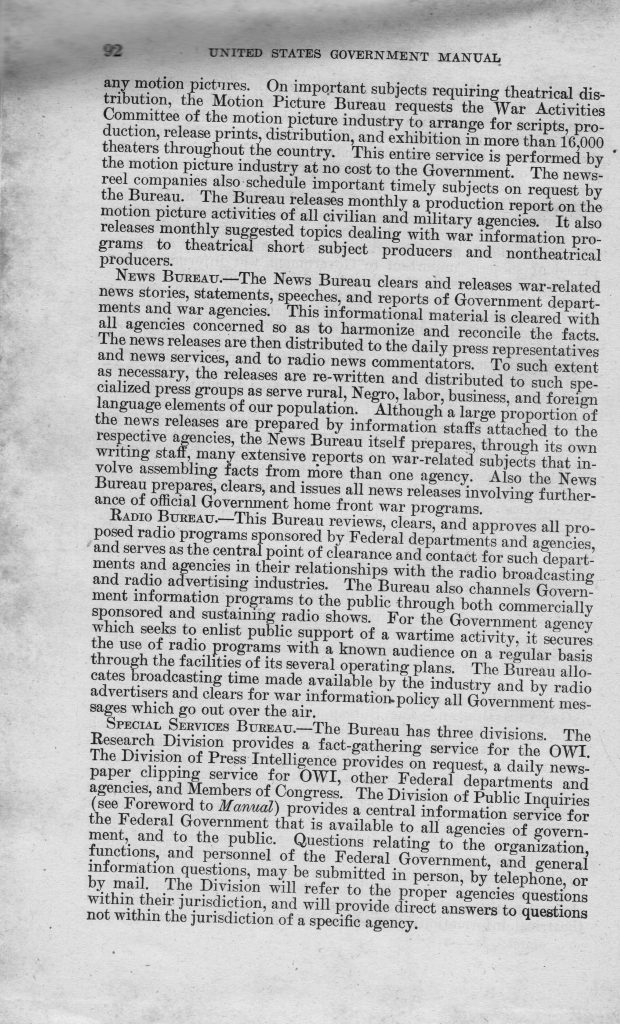
Official information about the Office of War Information (OWI) and the Office of Censorship as of March 1945 in United States Government Manual – 1945, First Edition, published by the Division of Public Inquiries, Office of War Information, Washington, DC, Government Printing Office 
Official information about the Office of War Information (OWI) and the Office of Censorship as of March 1945 in United States Government Manual – 1945, First Edition, published by the Division of Public Inquiries, Office of War Information, Washington, DC, Government Printing Office 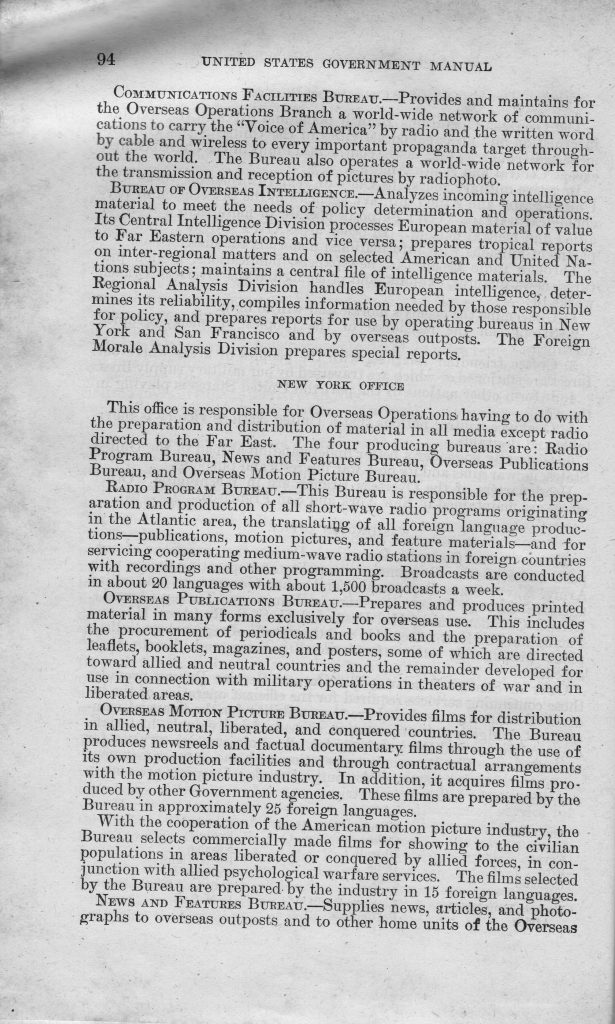
Official information about the Office of War Information (OWI) and the Office of Censorship as of March 1945 in United States Government Manual – 1945, First Edition, published by the Division of Public Inquiries, Office of War Information, Washington, DC, Government Printing Office 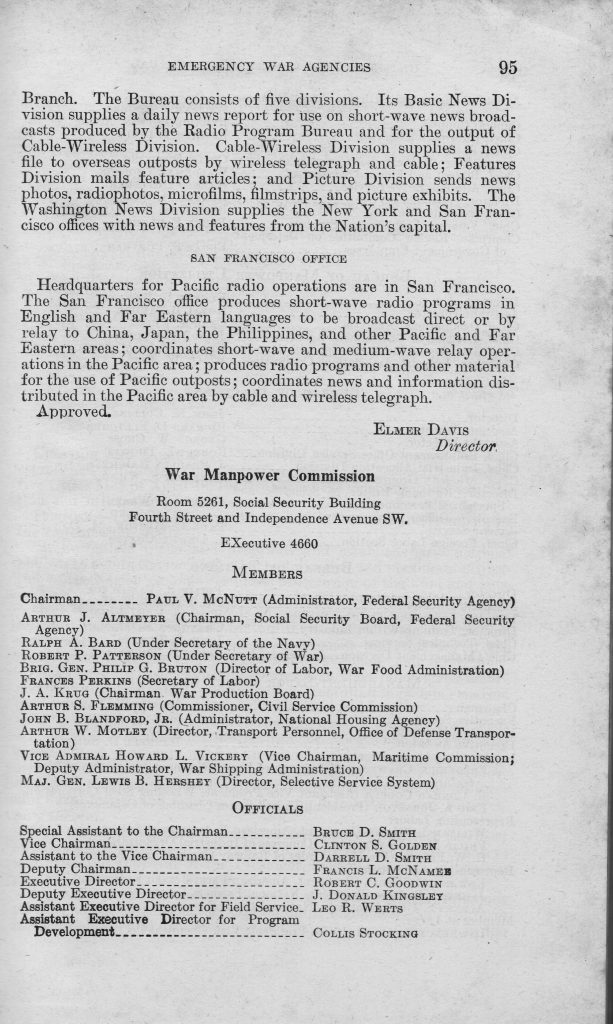
Official information about the Office of War Information (OWI) and the Office of Censorship as of March 1945 in United States Government Manual – 1945, First Edition, published by the Division of Public Inquiries, Office of War Information, Washington, DC, Government Printing Office 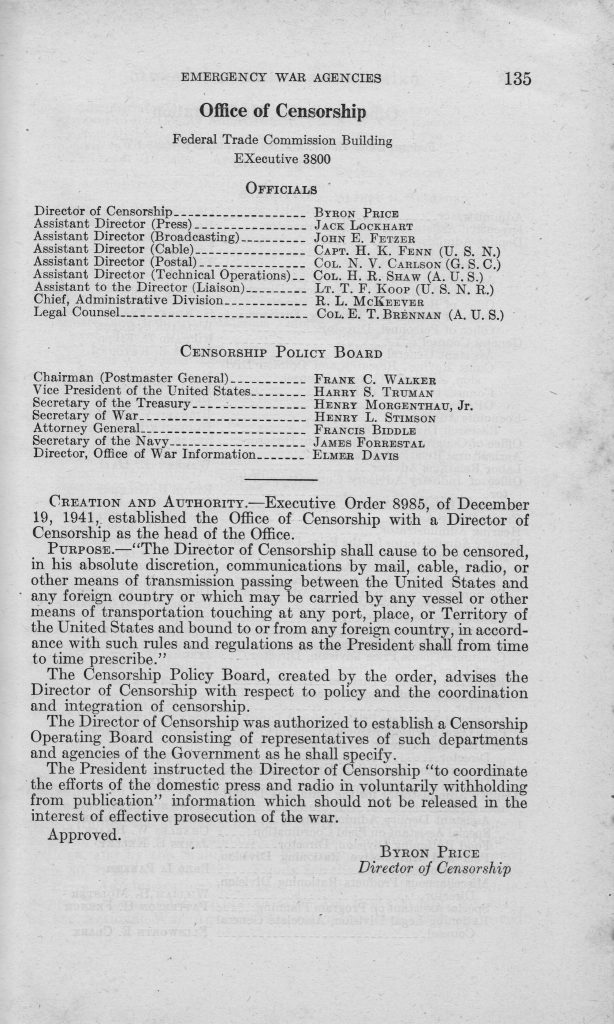
Official information about the Office of War Information (OWI) and the Office of Censorship as of March 1945 in United States Government Manual – 1945, First Edition, published by the Division of Public Inquiries, Office of War Information, Washington, DC, Government Printing Office

Ted Lipien is a journalist, writer, and media freedom advocate. He was Voice of America’s Polish service chief during Poland’s struggle for democracy and VOA’s acting associate director. He also served briefly in 2020-2021 as RFE/RL president. His book “Wojtyła’s Women” was published in 2008 by O-Books, UK. He is now an independent journalist and a media freedom advocate.





